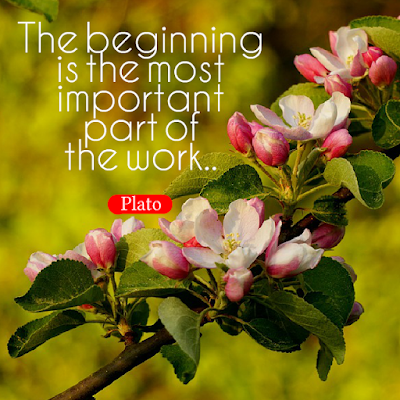Today's poster quotes Plato. He tells us that 'The beginning is the most important part of the work.' Everything else comes after the beginning, doesn't it? The middle and the ending.
Nancy Kress wrote a book titled Beginnings, Middles, and Ends which gives fiction writers some excellent advice on the three main parts of a story. It's a fairly old book but still worth a read. You can find it at your library or on a search engine. When I looked it up today, there were a few places where you could buy it for a very small price. If you write fiction, it's worth a read.
Back to the beginnings that Plato spoke of. It is a very important part of any story. The words in that section of the story did not just flow from the writer's fingertips. Instead, an idea was formed, a lot of thought was given to the development of the idea, and perhaps an outline was made. The bones were there, and the writer's next task was to flesh out the story.
How to begin? A good question as there are many ways to start a story. Some writers begin with a sense of place by describing the area where the story happens, or at least where the beginning occurs. It's easy to get carried away with this kind of beginning, and also easy to lose your reader if it goes on too long.
Others will begin with dialogue to pique interest in the reader. A moderator of an online writing group I was in long ago harped a lot on 'never open with dialogue.' Use an action or something to begin, then the dialogue. She claimed opening with dialogue was too jarring to the reader. An opinion, of course. If it works for you, do it. I once started a story this way: Nora picked up the wooden spoon and stirred the soup on the stove. "I'm going to Ireland," she said. "Did you hear me?" That simple sentence telling what Nora was doing as she spoke set the scene.
Open with a disaster. Like a robbery or a murder or a terrible accident. Attention grabber, some writers will tell you. It probably can be. It makes you sit up and pay attention, leaves questions to be answered by further reading.
When a character is telling a story, opening with him/her starting the story lets the reader know right away that he/she is going to be hearing from this person all through the tale. The character can give an opinion, tell something that happened, or wonder why their life is the way it is. Among other things.When a character narrates, we gain insight into their feelings almost immediately as well as characteristics of that person.
Open with a conflict of some kind. That can hook the reader by making them want to know what happens next, who comes out on top.
Writers will tell you that they often write several beginnings before settling on the one they feel is best. The beginning is your only chance to grab your writer and entice them to read further.
There is no middle or ending until there is a beginning, so Plato has some good insight when he told us that the beginning is the most important part.





No comments:
Post a Comment